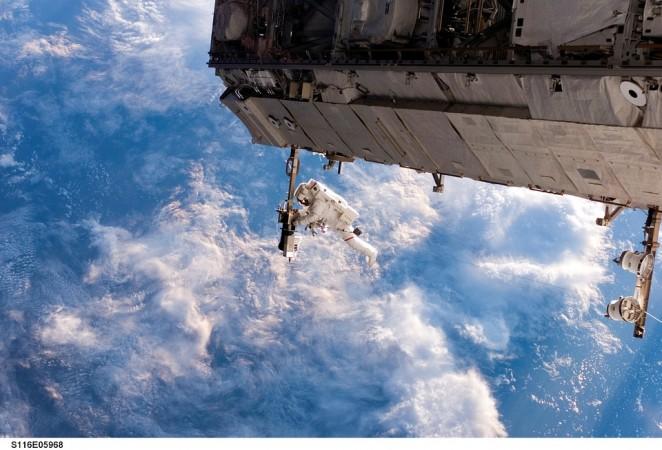
A new research claims that exposing astronauts to weightlessness caused by zero gravity for over 2.5 months can increase their body temperature by one degree — a phenomenon known as "space fever".
ALSO READ: NASA to hunt for alien life in first interstellar space flight for 2069
A research was carried out in which 11 astronomers were analysed before, during and after their stays on the International Space Station (ISS). The heat flow rate or heat flux of these astronomers was measured with the help of a new technology which helped gauge the minor changes taking place in their blood temperature.
"We developed a new technology which combines a skin surface temperature sensor with a heat flux sensor, and which is capable of measuring even minor changes in arterial blood temperature," Hanns-Christian Gunga, one of the researchers from the Charité Universitätsmedizin Berlin clinic in Germany, was quoted by a Science Alert report as saying.
The temperature of these astronauts was taken while they were at rest and then working out.
ALSO READ: NASA's Curiosity Rover spotted mysterious 'stick-like formations' on Mars
Very little research has been carried out on how our body's core body temperature (CBT) is impacted by weightlessness on the ISS.
CBT can be defined as the temperature of the body's internal environment, which includes organs like the heart, liver and blood.
This research is part of an effort which is looking to find out how exactly the bodies of spacefarers are affected by long-term space flights.
Exercise is crucial for astronauts to maintain their health while they are in space. The scientists observed that while the astronauts exercised, their core body temperature rose beyond 40°C (104°F). Having the same body temperatures on Earth could lead to severe results.
It was also found that the body temperatures of astronauts rose 1°C above the normal level of around 37°C (98.6°F) when they were at rest.
ALSO READ: Guys beware! Sex robots will make men obsolete in the future
The research unveiled that astronauts experienced a spike in their body temperature when they were exposed to weightlessness despite being at rest. The research is helping scientists gain more knowledge about how humans can survive outside Earth's orbit.
The astronomers take months to develop the temperature while their body tries to adapt itself to the life in space.
"This space fever, as we may call it, has potential implications for long-term space flights in terms of astronauts' health, wellbeing and support," the researchers wrote in their study, published in the journal Scientific Reports.
ALSO READ: Man with world's biggest penis: CT scan reveals truth
Here's how exactly the research was carried out:
- New ultra-sensitive sensors were used by the scientists 90 days before the astronomers took the first launch of the mission and it ended 30 days after they returned from the mission.
- The sensors were placed on the forehead of the 11 spacefarers and the readings were noted down.
- It was found that compared to Earth, the CBT of these astronomers rose faster in microgravity.
- This pointed towards crucial factors regulating the body temperature getting impacted by the space environment. These factors also include the heat emitted by our body in the surrounding environment, as well as the sweat produced by the body to cool itself.
- Sweat is known to evaporate at a slower rate in space, which causes overheating while exercising in the ISS, leading to space fever.
ALSO READ: This could improve men's performance in bed and make sex more enjoyable
"Under weightless conditions, our bodies find it extremely difficult to eliminate excess heat. The transfer of heat between the body and its environment becomes significantly more challenging in these conditions," said Gunga.
"Our results also raise questions about the evolution of our optimum core body temperature: how it has already adapted, and how it will continue to adapt to climate changes on Earth," Gunga concluded.















